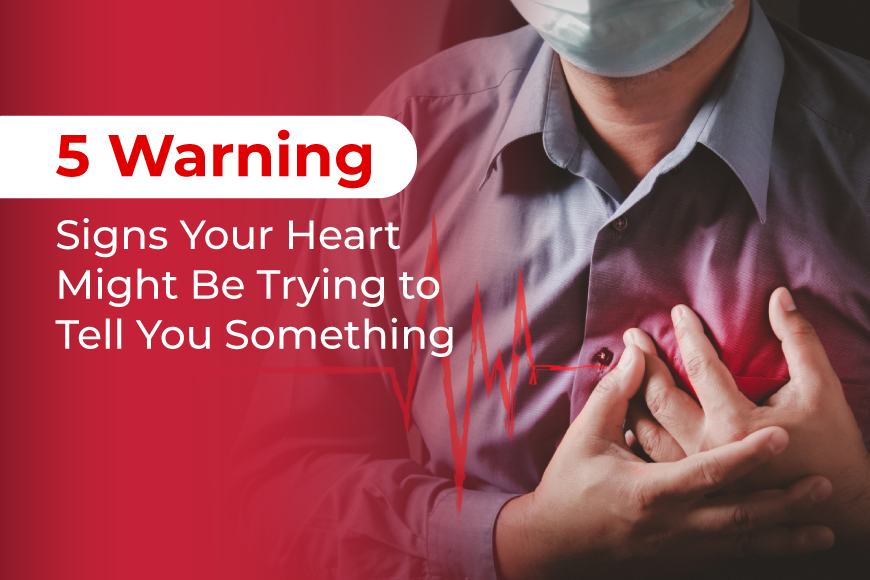It’s simple to ignore the small cues our bodies provide us in the everyday chaos and fast-paced pace of modern life. But when it comes to matters of the heart, being aware of the warning signs can help. It’s possible that your heart is trying to tell you something important, and you should listen to it. We’ll examine five warning signals that may point to underlying cardiac problems in this thorough guide, explaining their relevance and providing information on what you can do about them.
- Soreness or pain in the chest:
Pain or discomfort in the chest is one of the most common indicators of cardiac problems. It might appear as pressure, fullness, squeezing, or even pain that travels to your jaw, neck, shoulders, or arms. It’s important to pay attention to this discomfort, which can happen at rest or even during physical activity. It’s critical to get medical help right away if you feel chest pain since it may be an indication of angina or a heart attack.
A burning, heaviness, or constriction in the chest region is a common description of chest discomfort. A sudden stabbing pain or the sensation of someone pressing against your chest are some possible sensations. Even though conditions unrelated to the heart, like indigestion or muscle strain, can occasionally cause chest pain, it’s always best to be on the side of caution and have it checked out by the best cardiologist in Delhi.
- Breathing difficulties:
Breathlessness, especially after physical activity, maybe a sign that your heart is not pumping blood efficiently. This symptom could be indicative of heart failure, a condition in which the heart cannot pump enough blood to meet the body’s needs. It’s critical to keep an eye out for any changes in your breathing patterns and to speak with your healthcare physician as soon as possible.
Breathlessness may come on suddenly or gradually over time. You could feel as though you’re suffocating or are having trouble breathing. Wheezing, coughing, or chest discomfort are some possible symptoms. To find the root reason, you must seek medical assistance if you experience persistent dyspnea, especially if it interferes with your everyday activities.
- Exhaustion:
Unusual exhaustion or fatigue, particularly if unrelated to physical activity or insufficient sleep, may indicate heart problems. Your heart pumps blood throughout your body nonstop, so when it’s not working at its best, you could feel more exhausted than normal. If you are suffering from persistent weariness, you should see a healthcare provider for a medical assessment.
The sensation of fatigue linked to cardiac issues may differ from that of ordinary fatigue. It might be more noticeable and unaffected by sleep or relaxation. Additionally, you can feel weak or find it difficult to carry out daily duties. Keep an eye out for any shifts in your energy levels and talk to your physician about them.
- An irregular pulse:
Arrhythmia, the medical word for an irregular heartbeat, can act as a warning sign for hidden heart problems. Your chest may start to race, flutter, or experience palpitations. Although irregular heartbeats occur occasionally and are usually harmless, frequent or prolonged bouts may indicate a more significant issue. It’s imperative to get medical help for additional assessment if your irregular heartbeats are ongoing.
A skipped beat, an accelerated heart rate, or the feeling that your heart is hammering in your chest are all signs of irregular heartbeats. During these periods, you may also experience lightheadedness or dizziness. It’s critical to often check your heart rate and to get medical help if you discover any alarming changes.
- Swelling
Abdominal, foot, ankle, or limb swelling may be a sign of heart failure. If your heart is unable to pump blood efficiently, fluid may build up in your body and cause edema or swelling. Keep a watchful eye out for any inexplicable swelling, and notify the heart doctor in Delhi for a comprehensive evaluation and treatment.
Because of the accumulation of fluid in the legs and feet due to gravity, swelling related to heart failure is frequently more noticeable in the lower limbs. You may have discomfort wearing your shoes or find it hard to fit into your clothes. A sense of fullness or pain in the stomach might result from abdominal edema. It’s critical to keep an eye on any changes in your body’s patterns of swelling and talk with your doctor about them.
What’s Possible for You:
You must act appropriately if you notice any of these warning indicators. Seeking early medical intervention can help identify and treat underlying heart problems before they worsen. To fully assess your heart health, a cardiologist in Delhi might suggest diagnostic procedures such as an electrocardiogram (ECG), echocardiography, or blood testing. Treatment options may include lifestyle changes, medication, and invasive/non-invasive treatment to improve overall health and heart function, depending on the results.
In summary:
Your heart is your body’s engine, therefore you must pay attention to its warnings. Identifying the early indicators of heart problems and adopting preventative actions can improve your general heart health and prevent major problems. Do not hesitate to contact the best heart doctor in Delhi if you are experiencing any symptoms that warrant concern. Keep in mind that your heart matters, so give it top priority and pay close attention to what it is trying to tell you.


